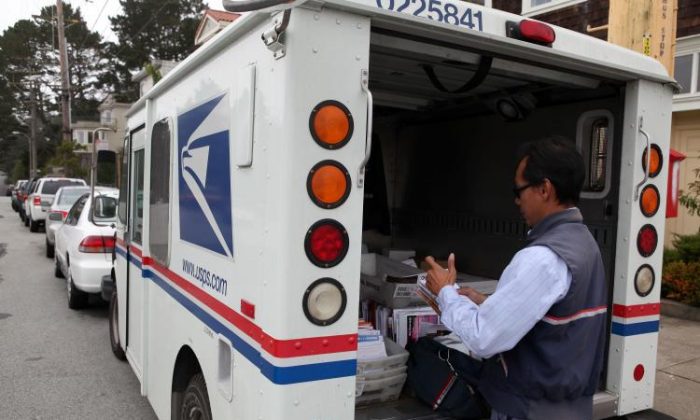
same law used by the U.S. Postal Service (USPS) as the basis for a sweeping intelligence program has also been interpreted to be highly restrictive on postal policing activities—raising questions among some critics about the legitimacy of USPS surveillance power.
When Postal Police Officers Association president Frank Albergo first read a leaked U.S. Postal Inspection Service (USPIS) memo about monitoring conservative anti-lockdown protestors, something in the fine print caught his eye.
Written at the bottom of the March bulletin, postal officials claim power to surveil and disseminate information about the right-wing protests under 18 U.S. Code 3061—a statute with which Albergo is familiar.
As a labor representative for some 500 postal police officers, Albergo has fought with the USPS over the meaning of U.S.C. 3061. Last summer, Postal Service authorities said 3061 largely confines postal police officers to USPS property—restricting them from patrolling the streets to protect letter carriers, blue collection boxes, and mail vehicles.
Albergo and his union think the USPS is restricting officers as a collective bargaining tactic to drive down their pay—by treating them as security guards rather than full police. But putting that dispute aside, Albergo said he’s puzzled at what he sees as a contradiction.
“So, according to the Postal Service, the law allows the Inspection Service to surveil Americans’ social media accounts while at the same time, the law doesn’t allow a uniformed police force to protect the mail and employees while away from postal premises,” Albergo told Pezou. “Only in the topsy-turvy world of the Postal Service could this make sense.”
Privacy advocates also have concerns about what the USPS calls the Internet Covert Operations Program (iCOP)—the existence of which was first revealed in April by Yahoo News. USPS faces lawsuits from the Electronic Frontier Foundation (EFF), Judicial Watch, the Electronic Privacy Information Center (EPIC), and the James Madison Project over iCOP.
EFF senior staff attorney Aaron Mackey said he has similar questions about where the USPS derives its surveillance authority. While disclaiming that he’s not an expert in Postal Service law, Mackey said he found it “odd” that the iCOP bulletin relied on U.S.C. 3061 as the basis for the program.
“As I read the statute, it provides limited powers for postal service law enforcement to investigate crimes, seek search warrants, and make arrests, but the scope of those powers is limited to the functioning of the postal service, its property, and related laws that protect mail,” he said.
“It’s hard to square the sprawling iCOP surveillance program with the specific, limited law enforcement powers Congress created in section 3061,” he told Pezou. “That’s partly why our FOIA lawsuit seeking records about iCOP has asked for documents that show the legal basis for the iCOP program.”
USPIS—the law enforcement wing of the USPS—did not reply to questions about where it derives its authority for iCOP. USPS media contacts also did not respond.
Postal Service officials have previously defended iCOP as a legal open-source intelligence operation designed to protect its employees.
Albergo was blunter in his assessment of whether U.S.C. 3061 authorizes iCOP.
“Absolutely nothing in 3061 could be construed as allowing such broad law enforcement jurisdiction,” he said, accusing USPIS of wanting to be a “quasi-NSA.”
Albergo also criticized the wisdom of the USPIS devoting resources to surveillance ops at the expense of having officers on the streets.
Multiple reports suggest that the Postal Service has been dealing with a drastic upswing in theft, fraud, and violent crime.
In September 2020, NBC News published a story reporting a 600-percent increase in mail theft reports over the prior three years, from about 25,000 in 2017 to roughly 177,000 through August 2020. A May 2021 USPS Inspector General report further found a 161-percent increase in mail theft complaints from March 2020 to February 2021.
And last month, Chief Postal Inspector Gary Barksdale announced that the USPIS responded to more than 7,000 reports of violent crimes against postal employees over the last year, including threats, assaults, and homicides.
“With the explosion in postal-related street crime, what exactly is the USPIS doing to stop it other than spending huge sums of money on surveillance?” Albergo asked. “ USPIS would rather investigate crime after it happens rather than stopping it.”
Albergo continues to fight for his officers to be back on the streets.
Postal Police Officers Association initially sued over the matter in September 2020, after Deputy Chief Inspector (DCI) David Bowers issued a memorandum stating that U.S.C. 3061 confines postal police officers to USPS property—what’s now referred to as the Bowers Memo.
Postal Police Officers Association sought an injunction on the policy confining officers until its grievance could be settled in arbitration. A U.S. district judge tossed the postal union’s lawsuit in Nov. 2020, declining to put a halt to the USPS policy.
parties continue to dispute the matter in arbitration.

NEW

NEW

4hr

5hr

6hr

7hr
Pezou : Post Office Claims Surveillance Powers Under Same Law Used to Curb Cops
